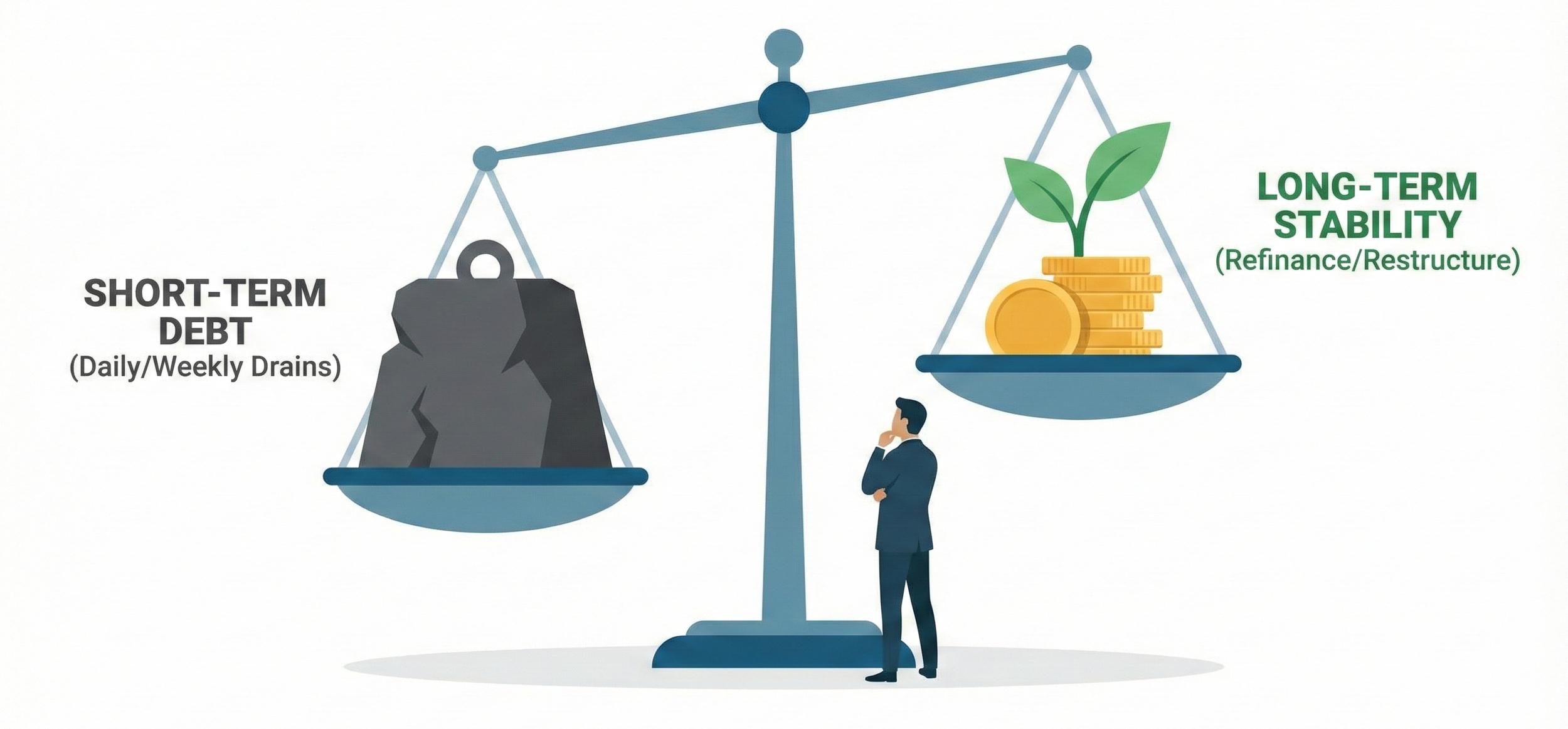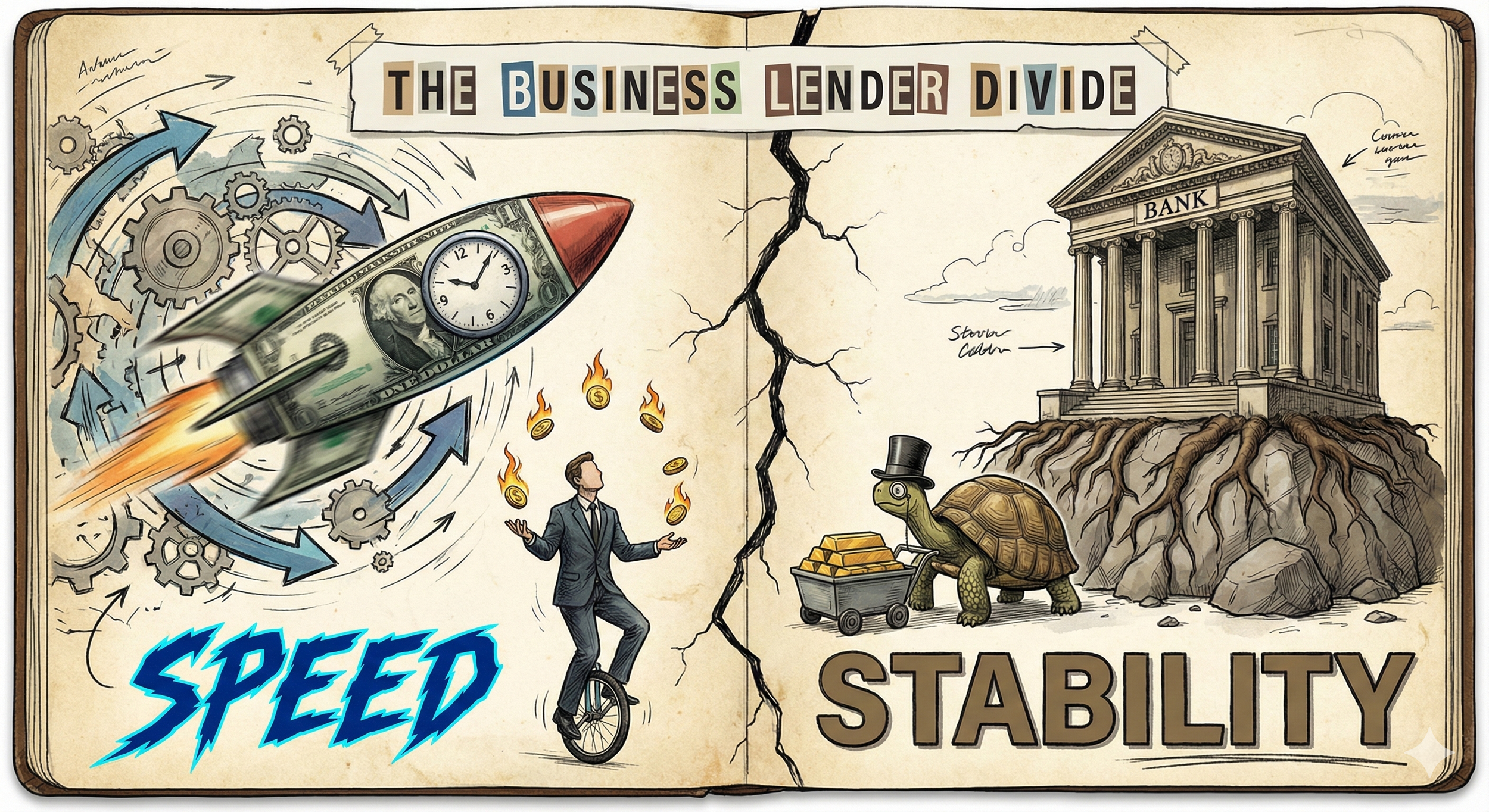Beware of Business Funding Brokers:
They Only Care About Commissions
Are you sick of the persistent and a perpetual hunt for business capital?
Whether it’s to cover payroll during a slow season, purchase new equipment to meet growing demand or fund a strategic expansion, the need for financing is a universal chapter in the entrepreneurial story.
In this high-stakes search, it’s easy to feel overwhelmed and isolated.
The pressure mounts, the clock ticks, and when a solution appears that promises speed and simplicity, it can feel like a lifeline.
This is the world where the business funding broker operates, often positioning themselves as a knowledgeable guide through the complex landscape of business lending.
However, behind the curtain of convenience lies a fundamental conflict of interest that every business owner must understand.
Their primary motivation is not your success, but their commission.
This article will pull back that curtain, expose the hidden mechanics of the business funding brokerage industry, and empower you to take back control of your company’s financing.
The Desperate Search for Capital:
A Familiar Story for Every Entrepreneur
Every business owner knows the feeling.
It’s that knot in your stomach when cash flow tightens, the quiet anxiety that creeps in late at night as you review your accounts.
You’ve poured your heart, soul, and savings into your venture.
It's more than a business; it’s your creation, a source of pride, and the livelihood for you and your employees.
The dream is to grow, to innovate, to serve your customers better, and to build something lasting.
But growth requires investment.
That new piece of machinery isn’t cheap.
Expanding to a second location feels like a monumental leap.
Even just making payroll after a few slow weeks can feel like a Herculean task.
You approach your traditional bank, the one where you have your business checking account, only to be met with a mountain of paperwork, strict collateral requirements, and a timeline that stretches for months and months.
They want years of pristine financial records, a flawless credit history, and a business plan that feels more like a doctoral thesis.
For many small businesses, especially those that are young, in a non-traditional industry, or have experienced a few bumps in the road, the answer is often a polite but firm "no."
This rejection can be disheartening.
It feels personal. It feels like the system is designed to keep the little guy out.
It’s in this moment of vulnerability and desperation that the allure of a quick, alternative solution becomes incredibly powerful.
You start searching online, and a world of fast cash and easy approval opens up, with the business funding broker standing at the gate, keys in hand.
Enter the "Savior":
The Alluring Promise of the Funding Broker
In your moment of need, the business funding broker appears as the perfect solution.
Their website is slick, their messaging is compelling, and their promises are exactly what you want to hear.
They speak your language.
They understand your urgency.
Their pitch is a masterclass in appealing to the pain points of a stressed entrepreneur.
They promise access to a vast, exclusive network of lenders you could never find on your own.
They promise to do the legwork for you, saving you precious time and sparing you the headache of filling out endless applications.
Most alluring of all, they promise speed—funds in your account in days, sometimes even hours.
The initial conversation feels like a breath of fresh air.
Unlike the stern banker, the broker is your cheerleader.
They tell you your revenue numbers look great and that getting you funded will be no problem at all.
The phrase "guaranteed approval" might even be whispered.
They create an intoxicating sense of possibility and relief.
Finally, someone gets it. Someone is on your side.
They present themselves not as a salesperson, but as a strategic partner, a financial matchmaker dedicated to connecting your business with its perfect funding partner.
They assure you that their service comes at no upfront cost to you, which sounds like an unbeatable deal.
They make the complex world of finance seem simple and accessible.
But this carefully crafted image of a benevolent guide obscures the stark reality of their business model, a model built not on your long-term success, but on the size and speed of their next commission check.
Decoding the Business Model:
Why Commissions Are King
To understand why you must be wary of business funding brokers, you must first understand how they make their money.
A broker is an intermediary.
They do not lend their own money.
Their role is to connect a borrower (your business) with a lender or business funder.
For this service, the lender pays the broker a commission.
This commission is almost always a percentage of the total amount of capital you receive.
Right away, you should see the glaring conflict of interest.
The broker's income is directly tied to two things: ensuring you take a loan, and ensuring that loan is as large as possible.
This compensation structure fundamentally misaligns the broker's interests with your own.
Your goal is to secure the most affordable capital with the best possible terms for your specific situation.
The broker's goal is to close a deal that generates the highest possible payout for them.
These two objectives are often mutually exclusive.
A broker has little to no financial incentive to find you the loan with the lowest interest rate or the most favorable repayment schedule.
In fact, they are often incentivized to do the exact opposite.
Lenders who offer more expensive, higher-risk products—like merchant cash advances or high-interest short-term loans—frequently pay the most generous commissions to brokers because these products are the most profitable for the lenders.
A broker who is "commission-focused" will naturally steer you toward these high-margin products, regardless of whether they are a good fit, or even a sustainable option for your business.
They are not a neutral advisor; they are a salesperson working for the lender who pays them the most.
The Hidden Costs:
How Broker Commissions Inflate Your Debt
When a broker tells you their service is "free," it's a dangerous half-truth.
While you may not write a check directly to the broker, you are absolutely paying for their services and often paying a steep price.
The commission the lender pays the broker is not absorbed by the lender out of the goodness of their heart. It is a cost of acquisition that is immediately passed on to you, the borrower.
This cost is baked into the terms of your funding agreement, effectively inflating your total debt burden.
Think of it this way: a lender has a target profit margin for every dollar they lend.
When they have to pay a substantial commission to a broker, they must increase the cost of the loan to protect that margin.
This increase comes in several forms.
It could be a higher factor rate or interest rate.
It could be a significant origination fee that is deducted from your loan proceeds before you even receive them.
For example, on a hundred-thousand-dollar loan, a ten-point commission paid to a broker means ten thousand dollars has to be accounted for.
That money will come out of your pocket, one way or another. You might be approved for a certain amount, but receive a lesser sum after fees are deducted, yet you are still required to pay back the full principal plus interest.
The broker's fee silently increases the true cost of your capital, turning what looked like a reasonable offer into a much more expensive form of debt that can strain your cash flow for months or years to come.
The "Shotgun" Approach:
Your Business Is Just a Number
A reputable financial partner takes the time to understand the nuances of your business.
They analyze your cash flow, understand your industry, and recommend a specific financial product tailored to your needs.
Many funding brokers, however, operate on a high-volume, low-effort model.
Instead of careful analysis, they employ what is known in the industry as the "shotgun" approach.
After you submit your application and sensitive financial documents—like bank statements and tax returns—the broker will blast them out to dozens of lenders in their network simultaneously.
To them, it's a numbers game.
The more lenders who see your file, the higher the chance that one will bite and make an offer.
This method is deeply problematic for several reasons.
First, it shows a profound lack of care and strategy.
Your business is not being thoughtfully matched; it's being treated like a commodity.
Second, and more critically, this can have a direct, negative impact on your business and personal credit scores.
When multiple lenders pull your credit report in a short period of time, it generates numerous hard inquiries.
A flurry of hard inquiries is a red flag to credit bureaus and lenders, as it can signal that a borrower is desperate for cash or being rejected by other institutions.
This can lower your credit score, making it even more difficult to obtain affordable financing in the future.
You came to the broker to solve a funding problem, and their careless process may have inadvertently created a new, long-term credit problem for you, all while your confidential financial information is being circulated far more widely than you ever intended.
Red Flags and Warning Signs:
How to Spot a Self-Serving Broker
Empowering yourself starts with knowing what to look for.
Self-serving brokers often use a similar playbook, and recognizing the tactics is your best defense.
If you encounter any of the following red flags during your search for funding, you should proceed with extreme caution or, better yet, walk away entirely.
First, be wary of high-pressure sales tactics.
A broker who creates a false sense of urgency, telling you an offer is "only good for today" or pressuring you to sign documents immediately, is not acting in your best interest. Sound financial decisions are never made under duress.
Second, listen for promises that sound too good to be true, because they always are.
Phrases like "guaranteed approval," "no credit check needed," or "everyone gets approved" are hallmarks of predatory operations. Legitimate lending always involves risk assessment.
Third, beware of a lack of transparency, especially around fees and the identities of the lenders.
If a broker is vague about how they are compensated or is unwilling to tell you which specific lenders they are sending your application to, it’s a major warning sign.
They may be hiding an exorbitant commission or preventing you from contacting the lender directly to get a better deal.
Finally, pay close attention to what products they push.
If the broker immediately steers you toward very expensive options like a Merchant Cash Advance (MCA) without first exploring more traditional term loans or lines of credit, they are likely prioritizing their commission over your financial health.
An honest advisor explores the best option for you, not the most lucrative one for them.
The Illusion of Choice:
A Curated List of High-Commission Lenders
One of the most powerful sales pitches a broker makes is that they provide access to a vast network of lenders, giving you a wealth of options you couldn't find yourself.
This creates an illusion of a competitive marketplace where lenders are vying for your business, ensuring you get the best deal.
The reality is often quite different.
A broker’s "network" is not a comprehensive directory of the entire lending market.
Instead, it is a carefully curated portfolio of lenders with whom the broker has a pre-existing commission agreement.
More often than not, this list is heavily skewed toward alternative, non-bank lenders who specialize in high-cost financing and pay the highest commissions to brokers.
You will rarely, if ever, find a broker who presents you with an offer from a credit union, or a prime online lender that offers low-interest Small Business Administration-backed loans.
Why?
Because these institutions either do not work with brokers or pay very small, unappealing referral fees.
The broker's network, therefore, isn't designed to give you the most choice; it's designed to give you the illusion of choice among a pre-selected group of high-profitability lenders.
You are only seeing a small, expensive slice of the funding pie.
You are being steered toward a specific outcome from the very beginning, all while believing you are exploring a wide open market.
The best and most affordable options are systematically excluded from the conversation.
Your Financial Future Is Your Responsibility:
A Final Word on Diligence
Ultimately, the power rests with you, the business owner.
You are the captain of your ship, and that includes navigating the sometimes-treacherous waters of business finance.
While brokers can seem like a tempting shortcut, the risks they introduce often far outweigh the convenience they offer.
Their entire business model is predicated on a conflict of interest that places their financial gain ahead of yours.
By understanding this dynamic, you can protect yourself and your business from predatory practices and expensive debt.
Make a commitment to due diligence. Never be afraid to ask hard questions.
Ask any potential funding broker or advisor, "How are you compensated for this transaction?"
Ask for a list of all fees, in writing.
Read every line of every document before you sign.
If you do not understand something, do not proceed until you do.
Best,
BERNARSKY ADVISORS
WHAT IS THE BEST AND SAFEST WAY FOR YOUR BUSINESS TO DEAL WITH HIGH BUSINESS DEBT PAYMENTS?
It is NOT by stopping ACH payments.
It is NOT by taking on another business loan.
It is NOT ALWAYS a Refinancing
It is NOT by entering into a debt settlement program.
Find out the BEST strategies to get your Business back to where it was



















